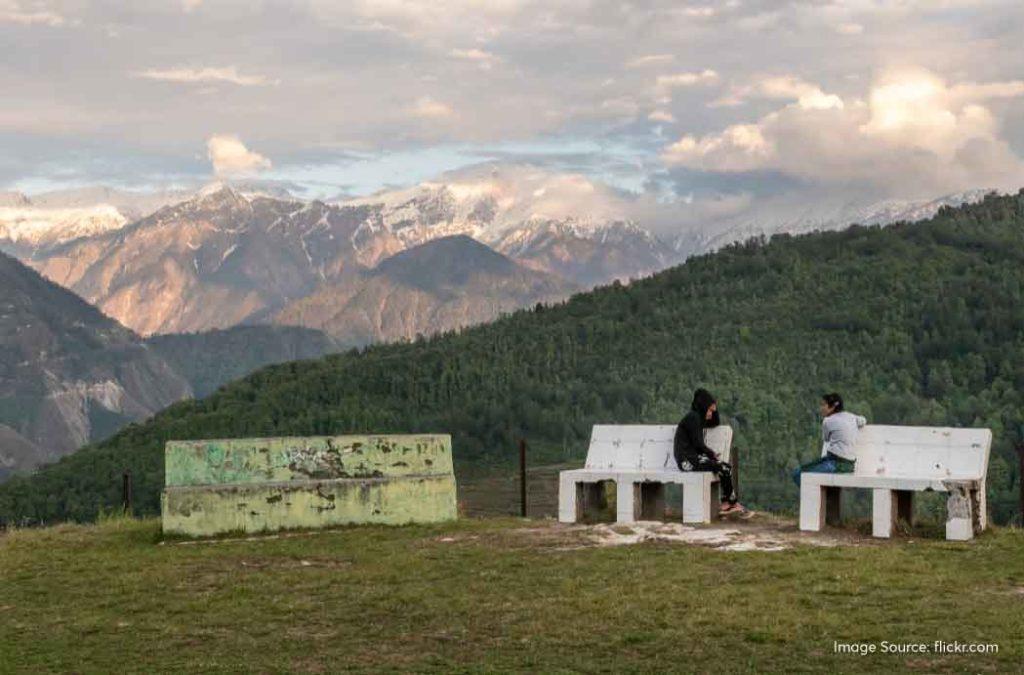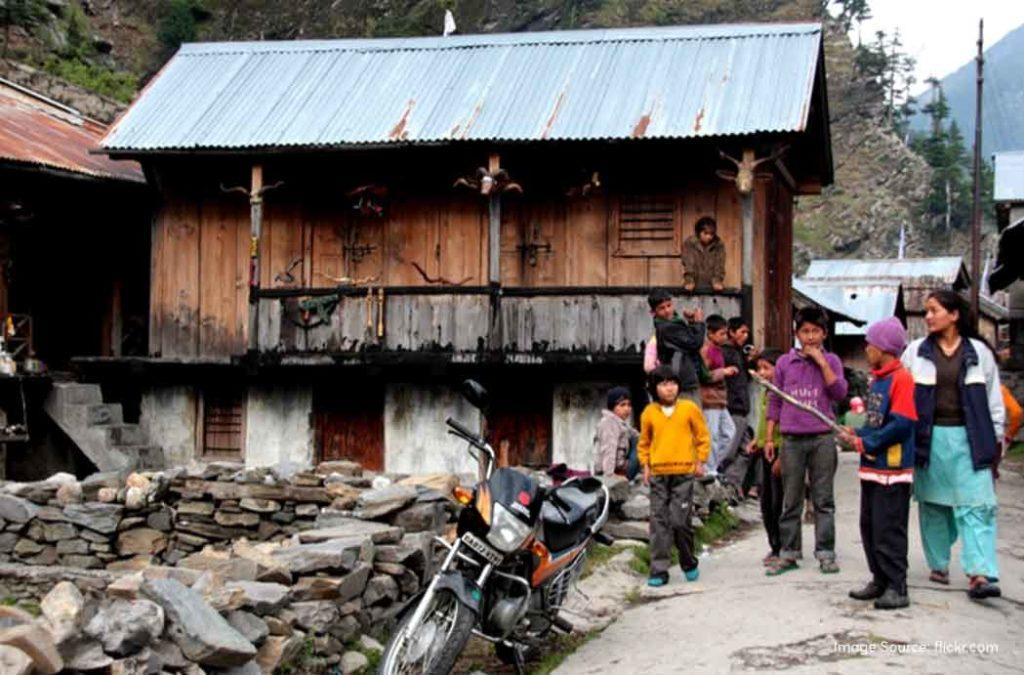Imagine the beauty of tranquil rivers flowing right next to your tiny settlement. That sure is a wonderful thought! What if you can honestly immerse in the charm of heartwarming landscapes on the foothills of the Himalayas? That’s exactly what you can experience in the scenic villages in Uttarakhand! The untouched rustic feel of every village in the state takes you away from the chaotic lifestyle.

You must be wondering how these villages in India offer something extraordinary compared to famous places like Dehradun and Mussoorie! Well, the answer lies in the aspects of rural tourism. Villagers welcome you in their cosy houses and massive farmlands. As the blanket of snow covers the land, you get to see awe-inspiring and undisturbed views of nature.
What’s more? It is the deep connection of villagers to their traditions and rituals. From their food habits to their practices of worship, everything is backed by elaborate narratives. Moreover, they love the environment to the extent that most villages remain undiscovered by wanderers. So, let’s dive into the mystical and high-altitude lands of Uttarakhand.
15 Villages in Uttarakhand: Tucked Away From the Ordinary
1. Mana
Known as the First Indian village, Mana is an awe-inspiring destination in the state. It was formerly known as the last Indian village; however, it has been renamed recently. This is because it is the very first village on the side of China. Located in the Chamoli district, it is one of the most visited villages in Uttarakhand.

What makes Mana special is the unseen beauty of the hills and the Saraswati river. If you are an adventure enthusiast, trek to the Vasudhara waterfall. Along with this, you get an opportunity to meet the loveliest locals who narrate stories of bygone times.
Apart from the gorgeous trek routes, Mana is special from a mythological point of view! It is believed that the five Pandava brothers passed from this village to reach heaven. Legend also suggests that Bheem, one of the Pandava brothers, built a bridge over the holy Saraswati river. Even today, you can spot the Bheem bridge elevating the divinity in Mana!
Book Budget Hotels in Kanatal
2. Munsyari
If you are a thrill seeker looking for a paradisiacal experience, Munsyari is just the right place for you! The destination offers stimulating peaks offering jaw-dropping views of blanketed snow. Trek to Birthi Falls only to witness an amalgamation of mystique and realistic nature! Other trekking sites also include Milam Glacier and Burfu Village.

Situated in the Kumaon region, Munsyari is one of the serene villages in Uttarakhand for a cosy getaway. You can enjoy everyday life with the locals. Try farming, animal grazing and cooking simplistic meals with families. Do not forget to go skiing at Khaliya Top and Betuli Dhar during the winter season.
Now that you are here, do not forget to explore the hidden gems of Uttarakhand wrapped in mysticism, solace and more!
3. Raithal
Who doesn’t love to see the mesmerising alpine meadows? Known for its laid-back lifestyle, Raithal is home to Dayara Bugyal. It is characterised by its divinity of alpine meadows. Sure, you need to trek to reach the top; however, the climb is totally worth it! After all, you get to see lush forests and well-known peaks, including Bandarpoonch and Srikanth.

If you are looking for a relaxed getaway, Raithal is one of the perfect villages in Uttarakhand for a laid-back vibe. It is best known for its traditionally made stone houses. You can also learn about the ancient farming practices. So, make sure to spend a night with locals for a wholesome experience.
4. Almora
Now is the time to explore the Kumaon region of the state, where nature provides absolute bliss! Almora is one of the popular villages in Uttarakhand known for a fusion of rich culture and modern influences. You can witness traditional agriculture styles passed down through generations. The region is characterised by rhododendron trees and pine forests.

Additionally, the village offers panoramic views of Nanda Devi and Trishul peaks. You can definitely seek blessings at the local Kasar Devi Temple, which attracts pilgrims throughout the year. Almora is the perfect spot for wildlife watching and shopping for handicrafts and woollen garments.
5. Sari
Who doesn’t love the majestic background of mountains wrapped in greenery? Sari is one of the picturesque villages in Uttarakhand where you can witness love among close-knit communities. From traditional customs to agricultural practices, locals here are strongly connected to their roots. Villagers engage in organic farming and have a deep respect for sustainable practices.

If you love adventure, you can trek upwards to witness Nanda Devi and Kamet peaks. Walk through the rustic houses and experience solace as Sari is less commercialised. You can also opt for camping near the Deoria Tal and enjoy stargazing in India with your loved ones. The trek takes around 2 hours; however, the climb is totally worth the hustle!
6. Champawat
Situated in the foothills of the Himalayas, Champawat is one of the stunning villages in Uttarakhand. If you are someone who loves to explore the local festivals, be a part of Nanda Devi Mela and Baisakhi in Champawat. You can experience folk music and traditional cuisine with the locals.

The village is especially popular for its rich heritage with the Baleshwar, Nagnath and Chandika temples. What’s more? Explore historic charm as you witness Banasur Fort for its ancient architecture. Interestingly, Advaita Ashram has to be your top-rated choice for a spiritual retreat with your loved ones.
7. Mukteshwar
Mukteshwar is definitely your go-to destination if you enjoy a blend of adventure and leisurely travel. Being one of the famous villages in Uttarakhand, it is characterised by serene surroundings. You can especially witness locals engaged in various farming and horticulture practices. What makes it a great spot is the fact that you get to see Nanda Devi and Trishul peaks from here.

Do not forget to seek the blessings of Lord Shiva from the Mukteshwar Dham. What’s more? It is popular for rock climbing and rappelling due to its tricky terrain. You can also include Bhalu Gaad waterfalls, Ramgarh market and Mukteshwar apple orchards on your list. Make sure to also savour authentic flavours by trying the aloo gutke, chainsoo and kafuli. It is best to book hotels in Mukteshwar for a serene time.
8. Malari
Situated in the Chamoli district, Malari is one of the traditional villages in Uttarakhand. It is more like stepping into a rustic scenario where everything seems like a fairy tale! Imagine the verdant landscapes and massive meadows right next to your stay. It is home to the Bhotia tribe, known for their handicraft-making skills. You can indulge in sheep rearing, photography, bird-watching and nature walks.

What makes Malari a top-rated destination is its proximity to the Niti Valley. Just like other valleys in India, this one is also known for its remote location and jaw-dropping beauty. It also serves as a base point for various trekking routes to discover the untouched landscapes. Nanda Devi National Park and Valley of Flowers are scenic trekking routes from Malari.
9. Gamshali
Who doesn’t love a quiet place away from the hustle and bustle? Gamshali is one of the underrated villages in Uttarakhand, offering a rural getaway. It is a great place for solo travellers, as the village is all about serenity and solace.

You can easily enjoy a peaceful time with the locals, as their houses are open to wanderers. Moreover, the village is home to many sacred temples along with their legendary tales of the bygone era. If you are an adventure lover, Gamshali is the best base for the Bhyundar Khal Trek and the Guptkhal Trek!
10. Pangoot
Do you love witnessing the colourful hues of avifauna? If yes, Pangoot or Pangot is one of the perfect villages in Uttarakhand to do so. Nestled in the Nainital district, the village is known for its natural beauty and forested surroundings. You can walk through oak, pine and rhododendron trees, allowing you to inhale fresh oxygen like never before!

What makes Pangoot a top-rate destination is its natural beauty. It is home to more than 300 species of birds right here. The woods make a perfect home for swift flights for these birds. Moreover, it is also a great destination for honeymooners due to its calm surroundings. You can trek to Jim Corbett National Park, thanks to the scenic trail from this village!
11. Bampa
Are you ready for an adrenaline rush? Because your blood is sure to flow swiftly as you lock your vision on the snow-capped mountains. Bampa is one of the scenic villages in Uttarakhand known for Dodi Tal and Darwa Top trekking trails. It is home to the Garhwal community with hardly a hundred members.

What makes Bampa special is its proximity to the dense forests. The area is surrounded by Himalayan black bears, leopards and musk deer. Additionally, you can witness age-old customs and rituals right here. So, get ready to discover farming practices and narratives of the old times by the locals.
12. Harsil
Stepping into a world of apple orchards is surely fascinating! Being one of the popular villages in Uttarakhand, Harsil Valley is best known for its apple production. According to local lore, a British personnel named Frederick Wilson introduced apple orchards in the village after he fell in love with a village girl. Who knows if that’s real? You can probably find out once you visit.

You can also witness the Apple Festival, where traditional music, handicraft displays and folk dances are at their peak. Along with this, Harsil is characterised by silent mountains where all you hear is the gushing of the Bhagirathi river. Get ready to dive into the poetic charm of the valley with ancient houses wrapped in tranquillity.
13. Bagori
Welcome to the ghost village of Uttarakhand! Bagori is located a few kilometres from Harsil, making it a go-to destination during your trip. You must be wondering if the village is connected to stories of spirits or mythological legends. However, the eeriness doesn’t always have to be about the narratives. Sometimes, natural sounds and views surprise you in a spooky way.

Bagori village experiences extreme snowfall, due to which villagers move to lower plains during the winter season. All houses are empty and the paths are filled with snow. As you walk through the village, all you hear is the sound of bells from the monastery and heavily flowing winds. The combination of these two sounds makes Bagori one of the mystical villages in Uttarakhand.
14. Kanatal
Known for its untouched beauty, Kanatal is one of the best villages in Uttarakhand. Located 78 kilometres from Dehradun, the village boasts of secluded spaces and silent corners. Most villagers follow Garhwali traditions and way of life. Moreover, you can experience warm hospitality reflecting community togetherness.

While Kanatal has a few sacred sites, you can explore a lot in its vicinity. You can trek to the Surkanda Devi Temple, known for its religious significance. It is one of 51 shakti peethas where the head of goddess Sati fell. If thrill is what you love, go for the Kodia Jungle Trek, as the trail takes you through dense forests and greenery. The village also has several camping sites. You can also book affordable hotels in Kanatal for a comfortable time.
15. Chopta
Imagine standing right against the snow-clad mountains only to breathe the fresh aroma of natural bliss. That is exactly the scene at Chopta! Being one of the pristine villages in Uttarakhand, it is home to sacred temples of Lord Shiva. The place attracts many trekkers who go on expeditions to discover the mystic beauty.

What’s more? It also serves as the base place for trekking to Tungnath and Chandrashila. If you love to witness wilderness, do take your binoculars along. Get ready to immerse in the adorable flora and fauna as Chopta is home to the famous Kedarnath Wildlife Sanctuary.
Things To Know Before Visiting Villages in Uttarakhand
- Many beautiful villages experience extreme snowfall, which is why villagers shift to other places. Make sure to check the temperature and weather details before the trip.
- Villagers are deeply rooted in their traditional systems and rituals. So, respect the local customs without showcasing any hatred or negative emotions towards them.
- It is difficult to find luxury accommodations, ATMs and internet connectivity. Be prepared for a local living experience with basic facilities only.

- It is ideal to learn a few phrases in Kumaoni and Garhwali if you are planning to visit the remote villages of the state.
- Respect nature and its elements by not throwing waste or littering the hills.
- Many villages are not accessible via cars or any mode of transport. Be ready to trek if you opt for such a destination.

- As many villages are close to forests and wild areas, be cautious of the jungle animals. It is best to enquire with a local before opting for such a path.
- It is best to carry packaged foods and ready-to-eat meals if you have a strong preference for certain foods.
- Always seek permission before capturing photographs of people and religious ceremonies.
Pack Your Snow Boots and Jackets!
As you step into these villages in Uttarakhand, you can sense relief and joy away from the everyday episodes of drama. Sure, you step on a strange land with low connectivity, simplistic food and traditional houses. But imagine the joy of staying with selective tribes of India, sharing cultural conversations and trying authentic foods. That’s where the rustic charm of the village comes to life. That’s also when you leave a piece of your heart on the land where you make the best of memories!






















